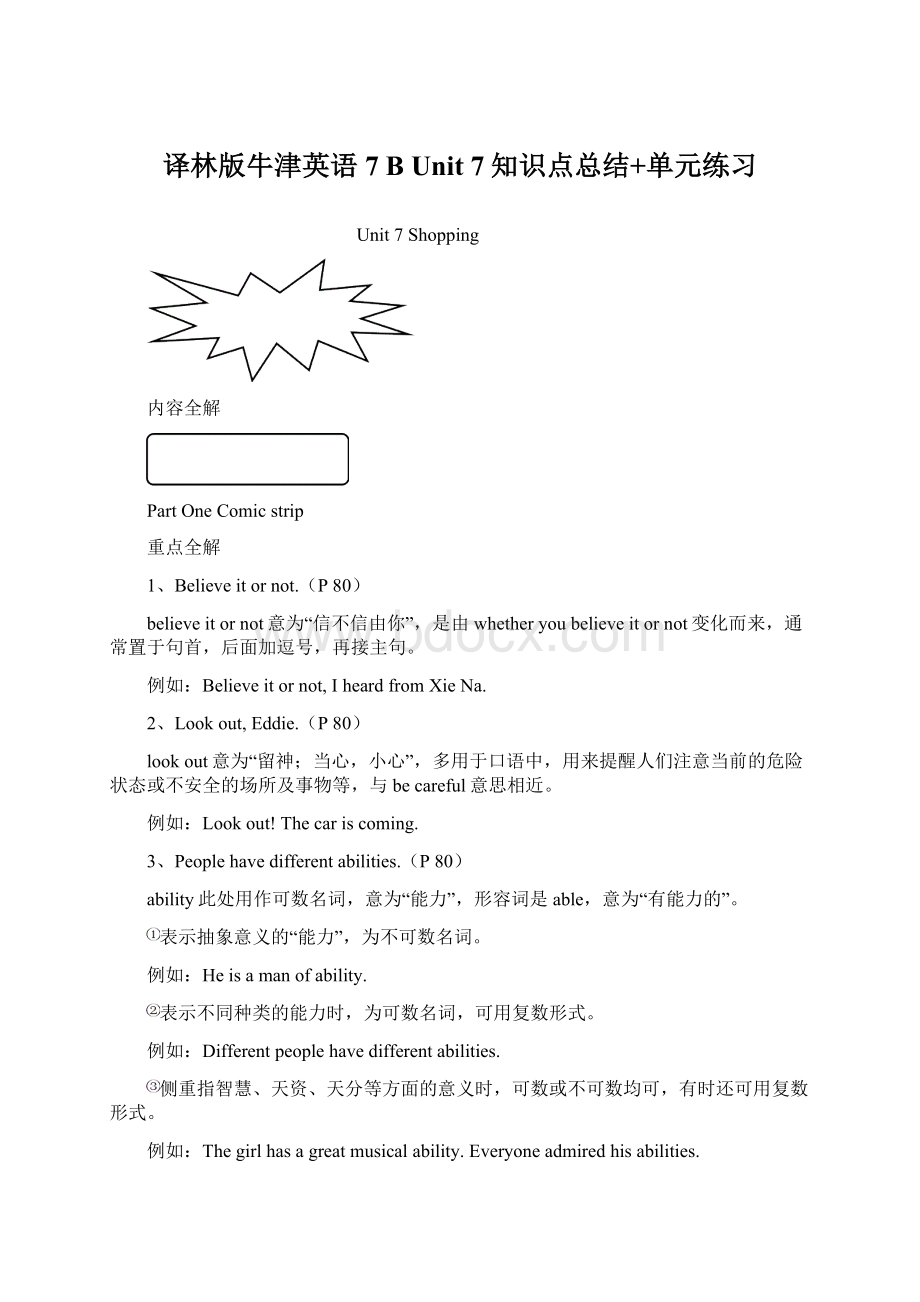译林版牛津英语7 B Unit 7知识点总结+单元练习.docx
《译林版牛津英语7 B Unit 7知识点总结+单元练习.docx》由会员分享,可在线阅读,更多相关《译林版牛津英语7 B Unit 7知识点总结+单元练习.docx(22页珍藏版)》请在冰豆网上搜索。

译林版牛津英语7BUnit7知识点总结+单元练习
Unit7Shopping
内容全解
PartOneComicstrip
重点全解
1、Believeitornot.(P80)
believeitornot意为“信不信由你”,是由whetheryoubelieveitornot变化而来,通常置于句首,后面加逗号,再接主句。
例如:
Believeitornot,IheardfromXieNa.
2、Lookout,Eddie.(P80)
lookout意为“留神;当心,小心”,多用于口语中,用来提醒人们注意当前的危险状态或不安全的场所及事物等,与becareful意思相近。
例如:
Lookout!
Thecariscoming.
3、Peoplehavedifferentabilities.(P80)
ability此处用作可数名词,意为“能力”,形容词是able,意为“有能力的”。
表示抽象意义的“能力”,为不可数名词。
例如:
Heisamanofability.
表示不同种类的能力时,为可数名词,可用复数形式。
例如:
Differentpeoplehavedifferentabilities.
侧重指智慧、天资、天分等方面的意义时,可数或不可数均可,有时还可用复数形式。
例如:
Thegirlhasagreatmusicalability.Everyoneadmiredhisabilities.
表示有能力做某事或具有做某事的能力等,其后通常要接动词不定式。
例如:
IthinkKittyhastheabilitytobeourmonitor.
PartTwoWelcometotheunit
B
重点全解
1、Wecansendsometothem.(P81)
send及物动词,意为“邮寄,发送,派遣”。
sendsthtosb=sendsbsth,意为“把某物寄给某人”,但当send后表示的词是代词时,只能用sendsthtosb形式,而不能用sendsbsth形式。
例如:
Theysentmeaboxoftoy.=Theysentaboxoftoytome.
与send有关的短语:
sendfor意为“派人去叫,派人去请”
例如:
Heisill.Pleasesendforadoctor.
sendaway意为“撵走,开除”
例如:
Thebosssenthimaway.
sendup意为“发射”
例如:
Man-madesatelliteshavebeensentupintospacebymanycountries.
2、Somefamiliesarenotevenabletopayforpensandnotebooks.(P81)
(1)beableto意为“能,会”,表示能力,与can同义。
例如:
Inthefuture,studentswillbeabletostudyathomewiththehelpofcomputers.
辨析:
beableto与can
beableto强调通过努力而获得的能力,而can强调自身已具有的能力。
例如:
ShecansingthesonginEnglish.
HewillbeabletosingthissonginEnglish,too.
beableto强调一种结果,而can只强调一种可能。
例如:
Luckily,hewasabletoescapefromthefireintheend.
Ifhegothereafewhoursearlier,Icouldsavehim.
beableto可以表示各种时态,而can只有一般现在时和一般过去时两种时态。
例如:
Icouldhelpyoulastnight,butyoudidn’tcome.
Canyouseeitthere?
Heis/was/willbeabletohelpyou.
(2)payfor意为“为...付款”,在句中常见的结构形式有:
pay(sb)moneyforsth付钱给(某人)买某物
例如:
Ihavetopaythem20poundsforthisroomeachmonth.
payforsth付某物的钱
例如:
Hecouldn’tpayforthecaratthattime.
payforsb替某人付钱
例如:
Don’tworry!
I’llpayforyou.
paysb付钱给某人
例如:
Theypayuseverymonth.
paymoneyback还钱
例如:
MayIborrow12yuanfromyou?
I’llpayitbacknextweek.
3、Wecanraisesomemoneyforthemtobuythesethings.(P81)
raise及物动词,意为“募集”。
raisemoneyfor...意为“为...筹钱”。
例如:
Thestudentsareraisingmoneyforasickgirl.
raise作及物动词时,还可意为“举起,提高,饲养”。
例如:
Pleaseraiseyourhandtoanswerthisquestion.
Don’traiseyourvoice.
Somepeopleraisecowsinmyhometown.
PartThreeReading
重点全解
1、Hewasbraveenoughtosavehisneighbourfromafire.(P82)
(1)brave形容词,意为“勇敢的”。
例如:
Heisaverybraveboy.
(2)save及物动词,意为“救,救助”。
save...from意为“从...中救出...”。
例如:
Themansavedaboyfromtheriveryesterday.
save作及物动词还可意为“节约”。
例如:
Itisimportantforustosavewater.
2、Suddenly,heheardsomeoneshouting“Fire!
Fire!
Help!
”(P82)
hearsbdoingsth意为“听到某人在做某事”。
例如:
Doyouhearsomeonesinginginthenextroom?
辨析:
hearsbdoingsth与hearsbdosth
hearsbdoingsth指听见某人正在做某事,强调听到的动作正在进行。
例如:
WhenIwentbacktomyroom,IheardherreadingEnglishinthenextroom.
hearsbdosth指听到某人做了或经常做某事,强调听到所做的事情已经结束或是经常性的行为。
例如:
Iheardhercomeinandgoupstairs.
Ioftenhearthegirlplaytheviolininthepark.
3、Hewentinandfoundhisneighbour,the79-year-oldMrsSun,inthekitchen.(P82)
79-year-old是一个合成形容词,意为“79岁的”。
这种合成形容词通常在句中作前置定语,修饰后面的名词。
其结构形式有两种:
数词+名词
例如:
100-metreracefive-yearsleepthree-yeartime
数词+名词+形容词
例如:
afive-year-oldboyan800-metre-longbridge
4、Herleftlegwasbadlyhurtandshecouldnotgetout.(P82)
hurt此处用作形容词,意为“受伤的”。
例如:
Ifyougethurt,youshouldgotothehospital.
hurt可作及物动词,意为“使受伤,伤害”。
例如:
Iwon'thurtyou.
hurt还可作不及物动词,意为“(身体某部位)感到疼痛”。
例如:
Mybackhurts.
5、Hepouredwateroverhisclothestoprotecthimself.(P82)
toprotecthimself在这里是不定式短语作目的状语。
动词不定式(短语)作目的状语时,既可以放在句首,也可以放在句末,常译为“为了...”。
例如:
Tokeepfit,myfatherhastogiveupsmoking.
6、HeputawetblanketoverMrsSunandhelpedherout.(P82)
helpsbout意为“帮某人克服困难、解决问题、脱离危险”。
例如:
Theteacheroftenhelpshisstudentsout.
Couldyouhelpmeout?
7、Latersomefiremencameandputoutthefire.(P82)
putout及物动词短语,意为“扑灭;熄灭”。
当它的宾语是名词时,可以放在其后,也可以放在put与out之间;当宾语为代词时,只能放在put与out之间。
例如:
Thepoliceputouttheforestfireatlast.=puttheforestfireout
Don’tsmokehere.Pleaseputitout.
与put有关的短语:
puton穿上putaway收拾好putoff推迟putup举起,张贴
8、Hewasinhospitalfortwoweeks.(P82)
inhospital是一个固定短语,意为“住院”。
例如:
MyuncleisinhospitalandImustvisithim.
拓展:
inhospital住院inthehospital在医院里
attable在吃饭atthetable在桌旁
infrontof在...(外部)的前面inthefrontof在...(内部)的前面
gotoschool去上学gototheschool去学校
bysea乘船bythesea在海边
gotobed上床睡觉gotothebed朝床边走去
PartFourGrammar
重点全解
1、--CanIborrowyourbike,Millie?
--Yes,youcan.Hereyouare.(P85)
“Hereyouare.”是英语中常用的句子,意思是“给你”或“你要的东西在这里”,用于别人向你要东西